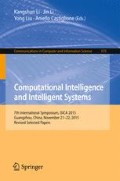Abstract
To the problem of scheduling multiple DAG workflow applications with multiple priorities submitted at different times in cloud computing environment, a novel workflow scheduling algorithm based on reinforcement learning is proposed in this paper. In the workflow scheduling scheme, the number of VMs in resources pool is defined as state space; the runtime of user task is defined as immediate reward, and then interactive with cloud computing environment to obtain the optimization policy. We use real cloud workflow to test the proposed scheme. Experiment results show the proposed scheme not only can solve the fairness of scheduling multiple DAGs with the same priority level submitted at different times, but also can ensure that the execution of the DAGs with higher priorities cannot be influenced by the DAGs with lower priorities. More importantly, the proposed scheme can reasonably schedule multiple DAGs with multiple priorities and improve utilization rate of resources better.
Access this chapter
Tax calculation will be finalised at checkout
Purchases are for personal use only
References
Workflow Management Coalition. http://www.wfmc.org/
Wikipedia. https://en.wikipedia.org
Tim, D., Ernst, J., Bernd, F.: On-demand resource provisioning for BPEL workflows using amazon’s elastic compute cloud. In: 9th IEEE/ACM International Symposium on Cluster Computing and the Grid, pp. 140–147. IEEE Press, New York (2009)
Eun, K.B., Yang, S.K.: Cost optimized provisioning of elastic resources for application workflows. Future Gener. Comput. Syst. 27(8), 1011–1026 (2011)
Guozhong, T., Yu, J., He, J.S.: Towards critical region reliability support for grid workflows. J. Parallel Distrib. Comput. 69(12), 989–995 (2009)
Guozhong, T., Yu, J., He, J.S.: Scheduling and fair cost-optimizing methods for concurrent multiple DAGs with deadline sharing resources. Chin. J. Comput. 37(7), 1607–1619 (2014)
Topcuoglu, H., Hariri, S., Min, W.: Performance-effective and low-complexity task scheduling for heterogeneous computing. IEEE Trans. Parallel Distrib. Syst. 13(3), 260–274 (2002)
Ming, T., Shoubin, D., Liping, Z.: A multi-strategy collaborative prediction model for the runtime of online tasks in computing cluster/grid. Cluster Comput. 14(2), 199–210 (2011)
Ming, T., Shoubin, D., Kejing, H.: A new replication scheduling strategy for grid workflow applications. In: 6th ChinaGrid Annual Conference (ChinaGrid 2011), pp. 74–80 (2011)
Jin, L., Qian, W., Cong, W., Ning, C., Kui, R., Wenjing, L.: Fuzzy keyword search over encrypted data in cloud computing. In: 29th IEEE International Conference on Computer Communications (INFOCOM 2010), pp. 441–445. IEEE Press (2010)
Li, J., Chen, X., Li, J., Jia, C., Ma, J., Lou, W.: Fine-grained access control system based on outsourced attribute-based encryption. In: Crampton, J., Jajodia, S., Mayes, K. (eds.) ESORICS 2013. LNCS, vol. 8134, pp. 592–609. Springer, Heidelberg (2013)
Ullman, J.D.: NP-complete scheduling problems. J. Comput. Syst. Sci. 10(3), 384–393 (1975)
Sutton, R.S., Barto, A.G.: Reinforcement Learning: An Introduction. MIT Press, Cambridge (1998)
Calheiros, R.N., Ranjan, R., Beloglazov, A., De Rose, C.A.F., Buyya, R.: CloudSim: a toolkit for modeling and simulation of cloud computing environments and evaluation of resource provisioning algorithms. Softw. Pract. Experience 41(1), 23–50 (2011)
Acknowledgments
The work presented in this paper was supported by National Natural Science Foundation of China (No. 61272382, 61402183). Key project of Guangdong Province in the research center of cloud robot (petrochemical) Engineering Technology (No. 650007). Guangdong Provincial Science and Technology Program (No. 2014A020208139); Distinguished Young Talents in Higher Education of Guangdong (No. 2013LYM-0057). 2014 Guangdong Provincial Technological Innovation Program (No. 650019). Wende Ke is corresponding author.
Author information
Authors and Affiliations
Corresponding author
Editor information
Editors and Affiliations
Rights and permissions
Copyright information
© 2016 Springer Science+Business Media Singapore
About this paper
Cite this paper
Cui, D., Ke, W., Peng, Z., Zuo, J. (2016). Multiple DAGs Workflow Scheduling Algorithm Based on Reinforcement Learning in Cloud Computing. In: Li, K., Li, J., Liu, Y., Castiglione, A. (eds) Computational Intelligence and Intelligent Systems. ISICA 2015. Communications in Computer and Information Science, vol 575. Springer, Singapore. https://doi.org/10.1007/978-981-10-0356-1_31
Download citation
DOI: https://doi.org/10.1007/978-981-10-0356-1_31
Published:
Publisher Name: Springer, Singapore
Print ISBN: 978-981-10-0355-4
Online ISBN: 978-981-10-0356-1
eBook Packages: Computer ScienceComputer Science (R0)

